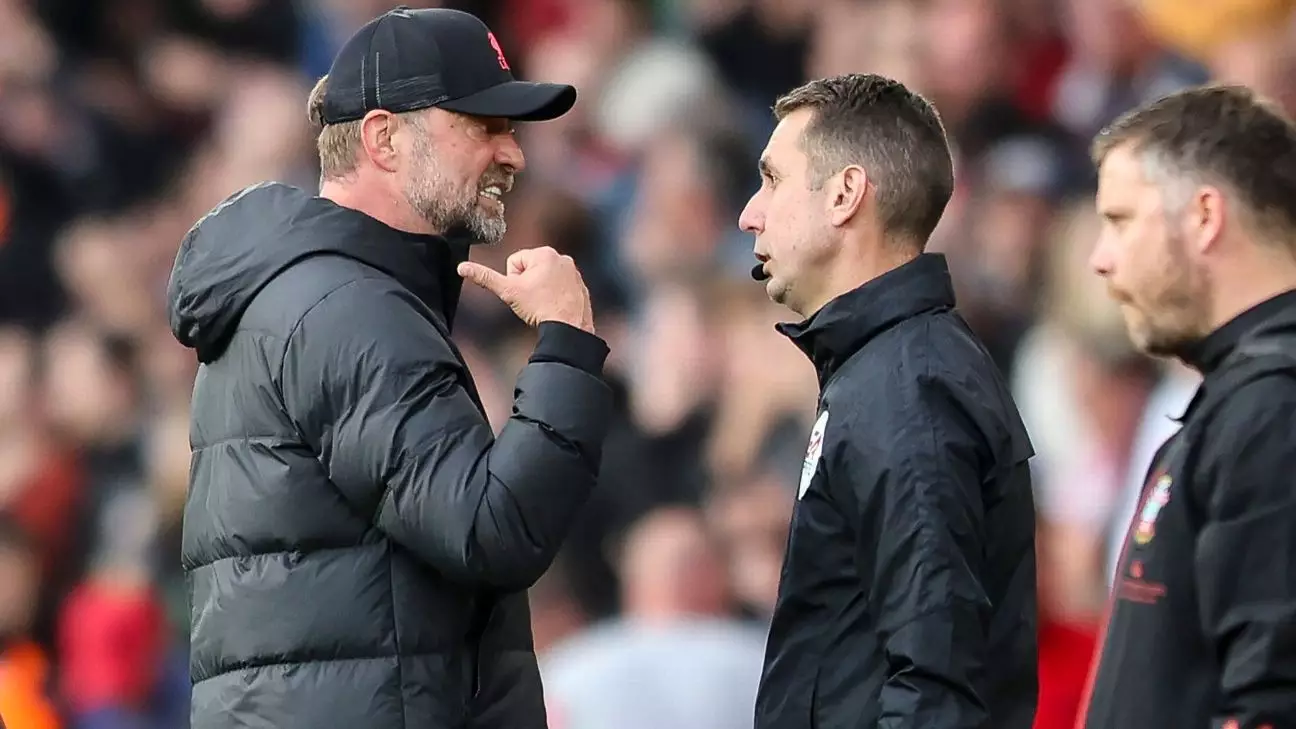In the high-stakes world of the Premier League, where every decision can pivot the fate of the game, the integrity of match officials is paramount. A recent incident involving refereeing stalwart David Coote has thrown this integrity into sharp relief, resulting in official suspension and heightened scrutiny over the conduct of referees. This case not only raises questions about Coote’s personal judgments and biases but also invites a broader dialogue on the ethical standards required of those officiating in such a competitive arena.
David Coote, a referee with significant experience in English football, has found himself at the center of a controversial scandal following the surfacing of a video that reportedly captures him making inappropriate remarks about Liverpool Football Club and its former manager, Jürgen Klopp. Within a context where unbiased officiating is non-negotiable, the gravity of these revelations cannot be overstated. Coote, seemingly candid about his distaste for Klopp, expressed derogatory views that could suggest a lack of professionalism, especially given the influence of referees in high-profile matches.
The English Football Association (FA) has responded swiftly, indicating that it is “aware of the matter” and conducting an investigation into the authenticity of the recordings. The implications of the inquiry are profound; if verified, Coote may face exclusion from his role as a top-flight official, casting a shadow over his career spanning several years in the Premier League. The potential repercussions cannot be understated, as the integrity of match officials directly influences the perception of fairness in the game.
The content of the video in question is unflinchingly candid. Coote, while seated beside an unidentified male, indulges in a critique of Liverpool and Klopp, using language that is unequivocally derogatory. The revelation that Coote likened Klopp to “absolute c—” speaks volumes about personal biases that could hinder an official’s capacity to remain impartial during crucial matches. The context of these comments indicates a level of disdain that could cloud his judgment on the pitch, presenting a conflict of interest that is unacceptable for any referee.
Particularly telling is Coote’s assertion that Klopp had previously “had a right pop at me” during a match against Burnley. Such statements reflect a personal vendetta rather than a professional critique, which transcends mere football banter. The reference to social distancing measures during the COVID-19 pandemic further delineates the timeline, revealing a possible moment of frustration for Coote that has evidently lingered in his professional demeanor.
Furthermore, the phrase “German c—” adds another layer of concern regarding Coote’s ability to maintain an unbiased stance, raising questions about the nationalistic undertones of his commentary. Such sentiments are harmful, not just for the individuals involved but for the integrity of a sport that prides itself on diversity and inclusivity.
With Coote temporarily sidelined, the refereeing body known as PGMOL (Professional Game Match Officials Limited) will undoubtedly face a scrutinizing eye in its protocols, selection, and training of officials. The selection of referees must not only encompass their skills and experiences but also their ability to handle the pressure and politics of such a charged environment. The PGMOL’s immediate response will serve as a case study for how referees should be held accountable for their conduct off the pitch.
The fallout from this incident emphasizes a looming need for rigorous ethics training completed with educational programs intended to foster respect for all clubs and their personnel. The broader implications echo beyond Coote’s circumstance, hinting at systemic issues pervading the entire officiating landscape in football.
The incident involving David Coote serves as a critical wake-up call. It underscores the essentiality for referees to exemplify impartiality, professionalism, and a commitment to the sport’s integrity. As investigations unfold and the consequences of Coote’s actions manifest, the football community must reflect on the ethical standards required of match officials. Upholding the integrity of the game is paramount, and as such, all involved must advocate for transparency, accountability, and a relentless pursuit of excellence in the officiating sphere. This incident may very well become a catalyst for change, encouraging the establishment of stricter ethical frameworks that safeguard the credibility of one of the world’s most beloved sports.


Leave a Reply